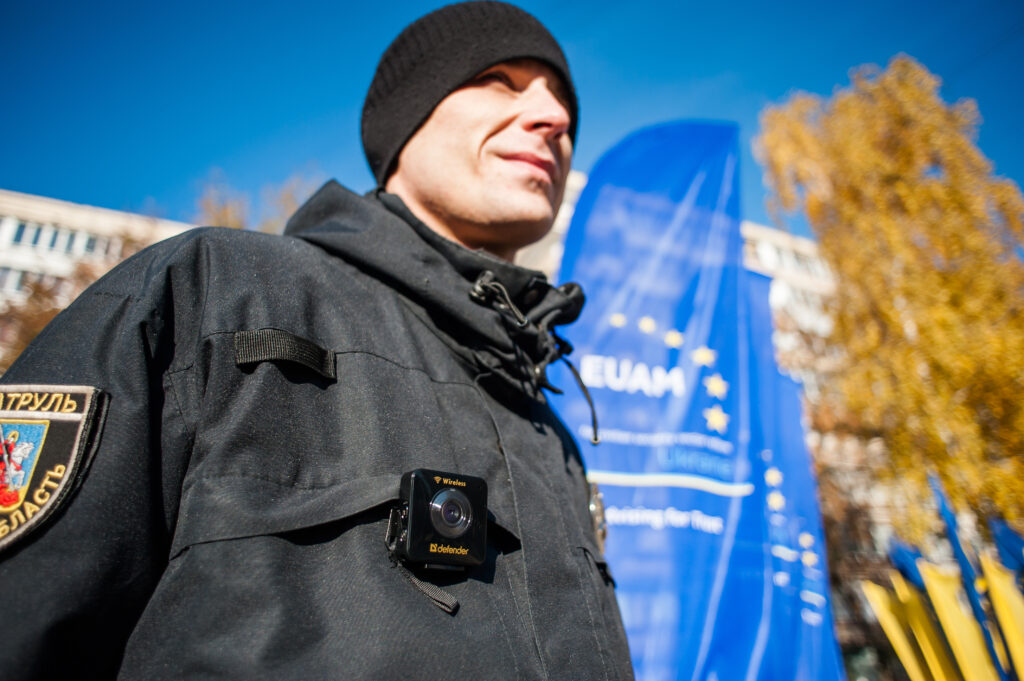
Blog: The European Union Advisory Mission to Ukraine (EUAM) – an example of the EU’s normative power
This year marked nine years since the beginning of the Revolution of Dignity — a momentous event that changed the very foundations of modern Ukraine and enshrined its European course as a compass for generations to come.
Back then, thrown in complete chaos ridden with myriad internal and external challenges, Ukraine’s path towards full membership in the European Union seemed almost beyond its bounds. Due to its Soviet legacy and virtually non-existent experience as an independent democratic state, Ukraine’s democratisation and transformation process with all its successes and setbacks did not always run smoothly. Like many other states that faced similar challenges, Ukraine was in dire need of a roadmap that would guide it through the process of turning into a well-functioning liberal democracy. The European Union, with its reputation as a normative power, offered Ukraine much-needed orientation and assistance in times of complete uncertainty.
The European Union as a normative power
The European Union is often referred to as a “normative power” — an important international player that is founded on values, norms and principles, such as democracy, the rule of law and respect for human rights. In practice, this means that cooperation with the EU is value-oriented and that deeper integration goes hand in hand with the absorption of certain normative standards fundamental to the EU’s identity. A reflection of the EU as a normative power that transfers its values and norms to other states can be seen in the EU’s enlargement policy in South-Eastern Europe. Deeper integration with the EU saw the alignment of the national practices with the EU’s standards, which has significantly contributed to the successful transformation and democratic consolidation process in these countries.
Another example of the EU acting as a normative power is its engagement through civilian missions, such as the European Union Advisory Mission to Ukraine (EUAM).
EUAM Ukraine is a civilian mission within the framework of the EU’s Common Security and Defence Policy (CSDP), launched by the EU in the summer of 2014 following a request from the Ukrainian government to support the authorities in developing new strategies on civilian security and implementing comprehensive reform efforts in areas such as police, law enforcement, judiciary, anti-corruption measures, respect for human rights and equality. In this vein, the European Union can be seen as a normative power that helps to introduce its normative standards in Ukraine, by offering guidance, advice on reform and providing training.
After the Revolution of Dignity, which saw a violent suppression of peaceful protests and multiple violations of human rights, the need to reform civilian security sector bodies became increasingly apparent. The reforms in this area also constitute the bedrock of Ukraine’s partnership with the EU, based on the Association Agreement signed in 2014 and even more now against the backdrop of Ukraine gaining EU candidate status.
The EU recognised the deficits in civilian security as one of the main reasons for Ukraine’s lack of resilience, which lies at the core of the EU’s Neighbourhood Policy. The deployment of EUAM was therefore aimed at restoring confidence in Ukrainian law enforcement structures and improving their efficiency and accountability as a larger effort to curb endemic corruption and increase the independence of key institutions from external political and financial influences. As the name of the mission suggests, the European Union Advisory Mission provides advice, training and expertise on key reform areas, having no executive power or punishment mechanisms.

Police reform
After gaining independence from the Soviet Union in 1991, Ukraine was literally left to its own devices when it came to undergoing the transition from an autocratic system to a democracy. As a result, most institutions inherited endemic problems from the ineffective Soviet system. The realisation that something needed to be changed in the law enforcement structures came only after the tragic events of the Euromaidan Revolution.
The police, which should have protected constitutionally guaranteed civil rights, did exactly the opposite by following the orders of the criminal authorities to disperse peaceful demonstrators in Kyiv, falling back on force and weapons. At the regional level, the police and judiciary were used to repress and intimidate activists who supported the Revolution in small towns. When the protests came to a halt and a new government was elected, it became obvious that the Ukrainian civil society would no longer tolerate the arbitrariness of law enforcement officials and that decisive reforms must follow.
The police reform officially began in 2015 — after the new law “On the National Police” came into force.
The newly created EUAM mission to Ukraine was one of the driving forces behind the reform of the Ukrainian Ministry of Internal Affairs and the National Police. During its operation in Ukraine, the EUAM provided not only strategic advice on implementing key law enforcement reforms in keeping with EU principles and international principles of good governance and human rights but also established miscellaneous training activities for police officers in Ukraine.
The main objective of the reform of Ukrainian law enforcement structures was to restore people’s trust in civil security institutions, which had been always phenomenally low and witnessed a significant deterioration after the Maidan Revolution. According to the survey of the Ukrainian Institute of Sociology of the National Academy of Sciences, the level of trust in the Ukrainian police in 2013 was 8%. Thanks to the successful reform of law enforcement institutions, people’s trust in the police showed a significant improvement. As of today, the National Police enjoys 59% trust among the population. This is evidenced by the results of a national survey conducted by the National Democratic Institute (NDI) and KMIS (Kyiv International Institute of Sociology). These significant improvements show that the reforms guided by the EUAM are beginning to take root in Ukraine and are of fundamental significance right now, as Russia continues to wage its unjustified war against Ukraine and the effectiveness of Ukrainian law enforcement institutions plays an important role in delivering justice to victims.
In addition, In 2019, with decisive support from EUAM, the National Police of Ukraine introduced a new public order concept and dialogue policing strategy, which enabled mass demonstrations, such as Pride Marches, to be held peacefully.
This year, the Ukrainian parliament also ratified the Istanbul convention — a treaty on the prevention of gender-based and domestic violence. EUAM Ukraine also supports the Ukrainian state in meeting its recommendations, such as preventing and prosecuting cases of gender-based and domestic violence, by virtue of strategic advice and awareness-raising campaigns for Ukrainian civil society and authorities.
Committed to the values of equality and respect for human rights, EUAM Ukraine supports Ukrainian authorities and law enforcement officials in their effort to curb gender-based sexual violence and bring perpetrators to justice. Every year, EUAM Ukraine also takes part in the #16DaysOfActivismAgainstGenderBasedViolence initiative, with the aim of raising awareness about gender-based violence. This year, the mission was joined by Young European Ambassadors from Ukraine who delivered their messages against gender-based violence in a video taken in different regions of Ukraine. At a time when Russia is waging war against Ukraine, their message strikes an important cord, as the war has resulted in a spike of gender-related sexual violence against both women and men, boys and girls. Young European Ambassadors from Ukraine call upon everyone to stand in solidarity with those victims and prevent gender-based violence.

EUAM’s support in investigating Russian war crimes
Since the adoption of the EUAM’s mandate in 2014, it has been expanded a few times. Against the backdrop of Russia’s invasion of Ukraine, the Council amended the mandate of the EUAM. Under the amended mandate, EUAM Ukraine renders assistance to the Ukrainian authorities to facilitate the investigation and prosecution of all war crimes committed in connection with Russia’s unprovoked military aggression against Ukraine.
The amended EUAM mission to Ukraine will thus provide strategic advice, training and equipment to the Ukrainian authorities on matters fundamental to investigating Russia’s war crimes. The Mission closely works with the International Criminal Court and with Eurojust, which will significantly improve the process of delivering justice and bringing war crimes to light.
Conclusion
Over the period of eight years of its operation in Ukraine, the European Union Advisory Mission to Ukraine has established itself as an important normative power that has been instrumental in drafting and implementing key reforms in the Ukrainian civilian security structures. Despite occasional setbacks which according to Dr. Shyamika Jayasundara-Smits can be attributed to “the ongoing armed conflict, the slow transition from Soviet values and mentality among Ukrainians and a fragile elite consensus between EU-EUAM and Ukrainian state security actors”, there is no denying the fact that EUAM‘s strategic engagement in Ukraine has to a large extent contributed to the success of Ukrainian reforms and will likely gain momentum in the light of Ukraine’s newly gained EU candidate status.
LATEST

How you can help the planet every day

Building Europe: Poland’s experience of joining the European Union and lessons for Ukraine

World Health Day 2024: My Health, My Right

EUREKA MEETS EUROPE – opportunities to develop and study. My experience

Can you wear pink in the workplace?
More campaign pages:
Interested in the latest news and opportunities?
This website is managed by the EU-funded Regional Communication Programme for the Eastern Neighbourhood ('EU NEIGHBOURS east’), which complements and supports the communication of the Delegations of the European Union in the Eastern partner countries, and works under the guidance of the European Commission’s Directorate-General for Neighbourhood Policy and Enlargement Negotiations, and the European External Action Service. EU NEIGHBOURS east is implemented by a GOPA PACE-led consortium. It is part of the larger Neighbourhood Communication Programme (2020-2024) for the EU's Eastern and Southern Neighbourhood, which also includes 'EU NEIGHBOURS south’ project that runs the EU Neighbours portal.

The information on this site is subject to a Disclaimer and Protection of personal data. © European Union,